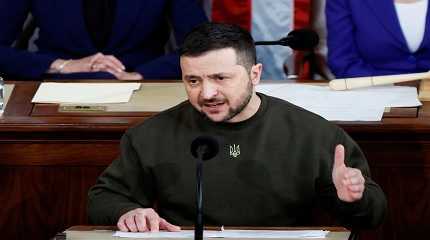
NEAR KREMINNA, Ukraine, March 14 (Reuters) - Ukraine's future hinges on the outcome of battles in the east, including in and around Bakhmut, President Volodymyr Zelenskiy said, with both sides describing brutal fighting as Russia intensifies a winter campaign to capture the small city.
Bakhmut has become the focus of Russia's invasion, with the months-long fight becoming Europe's bloodiest infantry battle since World War Two.
"It is very tough in the east - very painful," Zelenskiy said in his overnight video address, held nightly since Russia launched its invasion more than a year ago.
"We have to destroy the enemy's military power. And we shall destroy it."
Kyiv and Moscow gave differing accounts of negotiations to extend the Black Sea grain deal, established last year to prevent global famine by securing wartime exports from Ukraine and Russia, both among the world's top suppliers of food.
The arrangement, brokered by the United Nations and Turkey, is due to expire this week. Russia said it had been extended for 60 days, but Ukraine said the agreement required any extension to last 120 days. Turkey said talks were still ongoing.
In what would be the first international war crimes cases arising from the invasion, the International Criminal Court (ICC) is expected to seek the arrest of Russian officials for forcibly deporting children from Ukraine and targeting civilian infrastructure, a source told Reuters.
The Kremlin said the court has no jurisdiction over Russia.
Moscow would be certain to reject arrest warrants against its officials, but an international war crimes prosecution could deepen its diplomatic isolation over a campaign that has killed thousands of civilians and driven millions from their homes.
On the battlefront, Ukrainian soldiers said on Monday they were repelling attacks near Kreminna, north of Bakhmut.
In a forest some 8 km (5 miles) from the front, cannons boomed and explosions rumbled constantly in the distance.
A soldier was brought from the front with a wounded leg. He was stabilised in a van with a splint and painkillers before being taken to a medical centre.
"We stabilise the patient as much as possible," medic Mykhailo Anest, 35, said as a huge explosion rang out. "This means bandaging, inspecting tourniquets if any were applied, giving pain killers, treating infections, giving infusions... We do all of this so that once our patient arrives at the stabilisation point, he is as stable as possible."
On the other side of the front in Volnovakha, a Russian-controlled village to the south, the body of a woman lay on a street next to a ruined shop. A Russian military investigator told Reuters the area had been struck by Ukrainian shelling.
BAKHMUT GRINDER
Trench warfare, described by both sides as a meat grinder, has claimed a huge toll in Bakhmut, with both sides reporting hundreds of enemy troops killed each day. Neither side gives regular figures of its own casualties.
Russia says taking Bakhmut would open a path to capture all of surrounding Donetsk province, a central war aim. Ukraine, which has decided to defend Bakhmut rather than withdraw, says wearing out Russia's military there now will help its counter-offensive later.
Britain's Ministry of Defence said on Tuesday that Moscow was running short of ammunition, "to the extent that extremely punitive shell-rationing is in force on many parts of the front".
"This has almost certainly been a key reason why no Russian formation has recently been able to generate operationally significant offensive action," it said in a daily intelligence update.
But not every military analyst is convinced that defending Bakhmut is the best strategy for Ukraine.
Ukraine was suffering losses among reserves it intended to use for a later push against Russian forces, Ukrainian military analyst Oleh Zhdanov said in an interview. "We could lose here everything we wanted to use for those counter-offensives."
'INSTRUMENT IN HANDS OF WEST'
Russia launched what it calls a "special military operation" on Feb. 24 last year saying it had to demilitarise Ukraine to respond to a security threat. Kyiv and its Western allies reject that as a false pretext to subdue the country. Moscow now claims to have annexed a fifth of Ukraine.
The ICC, which opened an investigation into war crimes in Ukraine last year, is expected to seek its first warrants against Russian officials "in the short term", a source with knowledge of the matter said.
It was unclear which Russian officials the prosecutor might seek warrants against or when they might be issued. Charges could include the crime of genocide, the source said.
The ICC prosecutor's office declined to comment.
"The ICC is an instrument of neo-colonialism in the hands of the West," said Konstantin Kosachyov, deputy speaker of Russia's upper house of parliament.
Russia has pushed back against previous accusations that it had forcibly moved Ukrainians. It says it has taken Ukrainian children to Russia as a humanitarian effort to protect orphans and children abandoned in the conflict.
Ukraine says thousands of deported children are being housed in camps or adopted into Russian families, given Russian passports and brought up to reject Ukrainian nationality.
The U.N. genocide convention defines "forcibly transferring children of the group to another group" as one of five acts that can be prosecuted as genocide.




